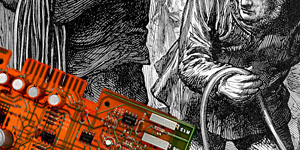


Technology is Our Iron Lung
Technology drives our civilization. Yet, today, as its rate of change accelerates, more and more of us in advanced countries seem to be disenchanted with it. Many of us leave our comfortable, well-heated homes only to burn enormous quantities of fossil fuels to toddle down to our clean and insanely well-stocked grocery stores, credit cards clutched firmly in hand. Too many of us are far, too far away from disappointing harvests, aching backs, and sunstroke to properly appreciate the rigors of the peasant life some seem to long for so dearly.In advanced nations it's even becoming quite fashionable to reject technology entirely and long for some mythical past. But romantic fantasies of the past focus can only on the tiny historical minority who had power to make a decent life for themselves. Because for the majority of our ancestors, life was pretty horrid and only technology saved us from it.
For most of western history, most people were poor, ignorant, dirty, and diseased. There was no such thing as hygiene. Even the grandest cities stank. Streets were open sewers. Waterways were polluted, and plagues were as natural and inevitable as the sunrise. Doctors, only recently risen from the ranks of butchers and barbers, killed and maimed as many patients as they cured. The cure for a hemorrhage was to bleed the patient. Most people's teeth rotted and fell out in their late twenties.
For eons, we killed our surplus infants as often as we killed our implacable enemies. Famine wasn't rare---it was a way of life. People were hanged for stealing a loaf of bread. One in ten women died in childbirth. Women were possessions. Children didn't go to school; they went to work. Even after African slavery was abolished, effective European slavery continued for the working poor until the late nineteenth century. And for the poor---which used to be almost all of us---there was no redress in the law, because going to court often meant being tortured by the judges.
In sum, until our very recent past, families were big, infant death rates were high, the middle class was tiny, justice was a joke, illiteracy was the norm, starvation was common, and medicine was a bottomless pit of ignorance.
Science and engineering changed all that. To give just one example, lifespans in advanced countries rose more in this century than they had in all the previous five hundred centuries of recorded history. At the beginning of this century most of us died in our forties, just as we had since time immemorial. Now, at century's end, those of us lucky enough to be born in advanced countries die in our seventies.
Since the first human hand snatched up a fiery branch accidentally created by lightning or volcanoes, we've been continually amazed by the possible. Fifty years ago we couldn't imagine changing our genes. A hundred years ago we only dreamed of flying through the air. Three hundred years ago we couldn't conceive of invisible microbes. We utterly failed to imagine all sorts of things we now take completely for granted: the Pill, electricity, X-rays, printing presses, antibiotics, aspirin, plastics, artificial fertilizers, moon shots, computers, biotechnology. All caught us by surprise.
Science gives us that cornucopia because we use it to ask the universe what things are really like, not what we would like them to be. Often the answers we get are startling, and they change our very lives. Yes, it is possible to generate power from certain rocks. Yes, it is possible to compute with certain other rocks. Yes, we can bioengineer ourselves. Science and engineering are so productive, so pivotal to improving our lives because the universe has a far better imagination than we ever will.
The arts and the humanities give our lives meaning, but science and engineering give us the means to live. Engineering supplies new tools for living, while science offers us new ways of thinking. The enemy has always been ignorance, not science and engineering. Technology has serious problems, yes. But the alternatives are worse.